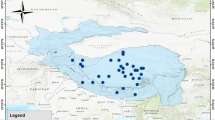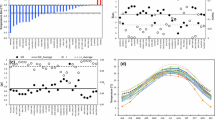Abstract
Multimodel assembling methods have been commonly used to improve the reliability of climate projections by extracting relevant information from a large future possible climate scenarios. In this aspect, this study adopted the Reliability Ensemble Averaging (REA) approach to combine the precipitation outputs of multiple climate models over South Korea. The quality of REA weights assigned to each climate model was investigated using the Taylor diagram; both of these approaches showed a similar weight assignation mechanism. Furthermore, the REA performance was evaluated with the bias and root mean square error in view of reproducing the historical climate characteristics over the study region; both performance indices revealed that the REA substantially improved the performances of individual climate models at all weather stations. The analysis also showed that the climate models performance was not consistent in reproducing the precipitation characteristics over different seasons in South Korea. Thus, this study used the seasonal REA weights of each climate model for the precipitation projection. There is a general consensus between the individual climate simulators on the increasing trend of the projected precipitation in 2070–2099, except for a slight decreasing trend observed with IPSL-CM5A-LR over some parts of the central region. In general, the projected precipitation obtained with the REA over South Korea will vary between 5.23 and 10.78% for 2070–2100 relative to 1976–2005. The maximum and minimum projected precipitation increases were observed over the western and eastern parts of South Korea, respectively.





Similar content being viewed by others
Data availability
Not applicable.
References
Boo KO, Kwon WT, Baek HJ (2006) Change of extreme events of temperature and precipitation over Korea using regional projection of future climate change. Geophys Res Lett 33(1)
Cannon AJ (2015) Selecting GCM scenarios that span the range of changes in a multimodel ensemble: application to CMIP5 climate extremes indices. J Clim 28(3):1260–1267
Chen J, Brissette FP, Poulin A, Leconte R (2011) Overall uncertainty study of the hydrological impacts of climate change for a Canadian watershed. Water Resour Res 47(12)
Collins W, Bellouin N, Doutriaux-Boucher M, Gedney N, Halloran P, Hinton T, Hughes J, Jones C, Joshi M, Liddicoat S (2011) Development and evaluation of an Earth-System model-HadGEM2. Geosci Model Dev 4(4):1051
Dessai S, Hulme M (2007) Assessing the robustness of adaptation decisions to climate change uncertainties: a case study on water resources management in the East of England. Glob Environ Chang 17(1):59–72
Dufresne J-L, Foujols M-A, Denvil S, Caubel A, Marti O, Aumont O, Balkanski Y, Bekki S, Bellenger H, Benshila R (2013) Climate change projections using the IPSL-CM5 Earth System Model: from CMIP3 to CMIP5. Clim Dyn 40(9–10):2123–2165
Exbrayat J-F, Viney N, Seibert J, Wrede S, Frede H-G, Breuer L (2010) Ensemble modelling of nitrogen fluxes: data fusion for a Swedish meso-scale catchment. Hydrol Earth Syst Sci 14(12):2383–2397
Georgakakos KP, Seo D-J, Gupta H, Schaake J, Butts MB (2004) Towards the characterization of streamflow simulation uncertainty through multimodel ensembles. J Hydrol 298(1–4):222–241
Giorgetta MA, Jungclaus J, Reick CH, Legutke S, Bader J, Böttinger M, Brovkin V, Crueger T, Esch M, Fieg K (2013) Climate and carbon cycle changes from 1850 to 2100 in MPI-ESM simulations for the Coupled Model Intercomparison Project phase 5. J Adv Model Earth Syst 5(3):572–597
Giorgi F, Mearns LO (2003) Probability of regional climate change based on the Reliability Ensemble Averaging (REA) method. Geophys Res Lett 30(12)
Giorgi F, Mearns LO (2002) Calculation of average, uncertainty range, and reliability of regional climate changes from AOGCM simulations via the “reliability ensemble averaging”(REA) method. J Clim 15(10):1141–1158
Her Y, Yoo S, Seong C, Jeong J, Cho J, Hwang S (2016) Comparison of uncertainty in multi-parameter and multi-model ensemble hydrologic analysis of climate change. Hydrol Earth Syst Sci Discuss 1–44
Jenkins G, Lowe J (2003) Handling uncertainties in the UKCIP02 scenarios of climate change. Hadley Centre, Technical note 44, Exeter, UK
Katsavounidis I, Kuo C-CJ, Zhang Z (1994) A new initialization technique for generalized Lloyd iteration. IEEE Signal Process Lett 1(10):144–146
Kay A, Davies H, Bell V, Jones R (2009) Comparison of uncertainty sources for climate change impacts: flood frequency in England. Clim Change 92(1–2):41–63
Kim Y.-O, Lee J.-K (2010) Addressing heterogeneities in climate change studies for water resources in Korea. Curr Sci 1077–1083
Kumar A, Mitra A, Bohra A, Iyengar G, Durai V (2012) Multi-model ensemble (MME) prediction of rainfall using neural networks during monsoon season in India. Meteorol Appl 19(2):161–169
Lutz AF, ter Maat HW, Biemans H, Shrestha AB, Wester P, Immerzeel WW (2016) Selecting representative climate models for climate change impact studies: an advanced envelope-based selection approach. Int J Climatol 36(12):3988–4005
McCarthy JJ, Canziani OF, Leary NA, Dokken DJ, White KS (2001) Climate change 2001: impacts, adaptation, and vulnerability: contribution of Working Group II to the third assessment report of the Intergovernmental Panel on Climate Change. Cambridge University Press
Mendlik T, Gobiet A (2016) Selecting climate simulations for impact studies based on multivariate patterns of climate change. Clim Change 135(3–4):381–393
Oh S.-G, Suh M.-S, Lee Y.-S, Ahn J.-B, Cha D.-H, Lee D.-K, Hong S.-Y, Min S.-K, Park S.-C, Kang H.-S (2016) Projections of high resolution climate changes for South Korea using multiple-regional climate models based on four RCP scenarios. Part 2: precipitation. Asia-Pacific Journal of Atmospheric Sciences 52(2):171–189
Palmer T, Alessandri A, Andersen U, Cantelaube P, Davey M, Delécluse P, Déqué M, Diez E, Doblas-Reyes FJ, Feddersen H (2004) Development of a European multimodel ensemble system for seasonal-to-interannual prediction (DEMETER). Bull Am Meteor Soc 85(6):853–872
Pierce DW, Barnett TP, Santer BD, Gleckler PJ (2009) Selecting global climate models for regional climate change studies. Proceedings of the National Academy of Sciences, pnas. 0900094106
Prudhomme C, Davies H (2009) Assessing uncertainties in climate change impact analyses on the river flow regimes in the UK. Part 1: baseline climate. Clim Change 93(1–2):177–195
Raftery AE, Gneiting T, Balabdaoui F, Polakowski M (2005) Using Bayesian model averaging to calibrate forecast ensembles. Mon Weather Rev 133(5):1155–1174
Rajib MA, Sultana S, Saha M, Rahman MM (2014) A multi-model ensembling approach for developing plausible countryscale climate change scenarios for future. J Earth Sci Clim Change 5(2):1
Sansom PG, Stephenson DB, Ferro CA, Zappa G, Shaffrey L (2013) Simple uncertainty frameworks for selecting weighting schemes and interpreting multimodel ensemble climate change experiments. J Clim 26(12):4017–4037
Seo SB, Kim Y.-O, Kim Y, Eum H.-I (2018) Selecting climate change scenarios for regional hydrologic impact studies based on climate extremes indices. Clim Dyn 1–17
Tatebe H, Ishii M, Mochizuki T, Chikamoto Y, Sakamoto TT, Komuro Y, Mori M, Yasunaka S, Watanabe M, Ogochi K (2012) The initialization of the MIROC climate models with hydrographic data assimilation for decadal prediction. Journal of the Meteorological Society of Japan. Ser II 90:275–294
Taylor KE (2001) Summarizing multiple aspects of model performance in a single diagram. J Geophys Res Atmos 106(D7):7183–7192
Tebaldi C, Knutti R (2007) The use of the multi-model ensemble in probabilistic climate projections. Philos Trans Royal Soc London: Math Phys Eng Sci 365(1857):2053–2075
Tegegne G, Kim YO, Lee JK (2019) Spatiotemporal reliability ensemble averaging of multimodel simulations. Geophys Res Lett 46(21):12321–12330
Tegegne G, Melesse AM, Worqlul AW (2020) Development of multi-model ensemble approach for enhanced assessment of impacts of climate change on climate extremes. Sci Total Environ 704:135357
Viney NR, Bormann H, Breuer L, Bronstert A, Croke BF, Frede H, Graeff T, Hubrechts L, Huisman JA, Jakeman AJ (2009) Assessing the impact of land use change on hydrology by ensemble modelling (LUCHEM) II: Ensemble combinations and predictions. Adv Water Resour 32(2):147–158
Voldoire A, Sanchez-Gomez E, y Mélia DS, Decharme B, Cassou C, Sénési S, Valcke S, Beau I, Alias A, Chevallier M (2013) The CNRM-CM5. 1 global climate model: description and basic evaluation. Clim Dyn 40(9–10):2091–2121
Wilby RL, Harris I (2006) A framework for assessing uncertainties in climate change impacts: Low‐flow scenarios for the River Thames, UK. Water Resour Res 42(2)
Wilcke RA, Bärring L (2016) Selecting regional climate scenarios for impact modelling studies. Environ Model Softw 78:191–201
Wu T (2012) A mass-flux cumulus parameterization scheme for large-scale models: description and test with observations. Clim Dyn 38(3–4):725–744
Xu Y, Gao X, Giorgi F (2010) Upgrades to the reliability ensemble averaging method for producing probabilistic climate-change projections. Climate Res 41(1):61–81
Zhang X, Alexander L, Hegerl GC, Jones P, Tank AK, Peterson TC, Trewin B, Zwiers FW (2011) Indices for monitoring changes in extremes based on daily temperature and precipitation data. Wiley Interdiscip Rev Clim Change 2(6):851–870
Acknowledgements
The author greatly acknowledge the climate modeling groups listed in Table 1 for producing their climate model output. The recorded precipitation data from 60 weather stations over South Korea were retrieved from the Korea Meteorological Administration (https://www.kma.go.kr/).
Author information
Authors and Affiliations
Contributions
GT worked on the data analysis, conceptualization, formal analysis, investigation, methodology, software, and writing—original draft. AMM worked on investigation and review and editing. All authors read and approved the final manuscript.
Corresponding author
Ethics declarations
Competing interests
The authors declare no competing interests.
Additional information
Publisher's note
Springer Nature remains neutral with regard to jurisdictional claims in published maps and institutional affiliations.
Rights and permissions
Springer Nature or its licensor (e.g. a society or other partner) holds exclusive rights to this article under a publishing agreement with the author(s) or other rightsholder(s); author self-archiving of the accepted manuscript version of this article is solely governed by the terms of such publishing agreement and applicable law.
About this article
Cite this article
Tegegne, G., Mellesse, A.M. Multimodel ensemble projection of precipitation over South Korea using the reliability ensemble averaging. Theor Appl Climatol 151, 1205–1214 (2023). https://doi.org/10.1007/s00704-022-04350-8
Received:
Accepted:
Published:
Issue Date:
DOI: https://doi.org/10.1007/s00704-022-04350-8




